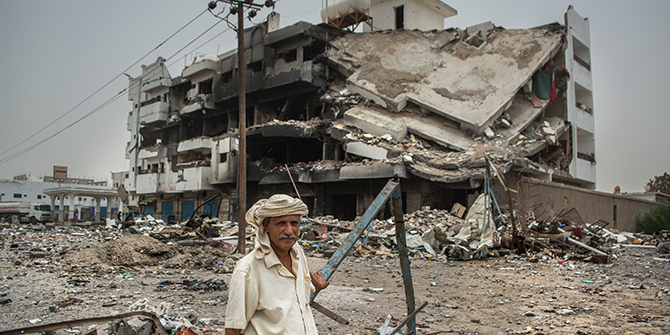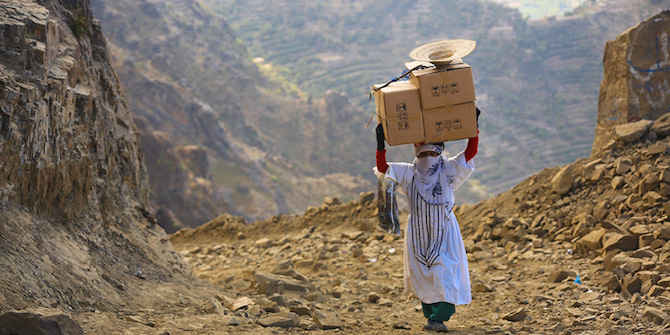by Salama Mubarak
#LSEYemen

According to a recent report by the UNOCHA, an estimated 21.2 million people – 82 percent of the total population of Yemen – need humanitarian assistance. This report was published one year after the armed conflict escalated across Yemen. The report noted that 14.4 million Yemenis are vulnerable to food insecurity, 19.4 million people do not have access to clean water and sanitation system, and 14.1 million citizens of Yemen are without adequate healthcare. According to the 8th Task Force Population movement report released in April by the UN protection cluster in Yemen, 2.7 million people are internally displaced within Yemen due to the ongoing conflict. Yemen is a country with an estimated population of 26 million, an estimate that shows that we have 26 million war stories to be told each from a different perspective.
Away from the many news stories and political analysis, I would like to use this opportunity to tell you three war stories. It is pertinent to add a name and face to all stories, perhaps the world will see us as people, parents, wives, husbands, daughters, sisters, brothers, friends and not only numbers. I did not pick these three stories because they are the worse or the saddest; but because they have a poignant influence on my psyche.
A shootout
A friend called me at around 10:00 am, saying that two people were shooting outside his doorstep. He later found both of them bleeding, and decided to treat them in his house. Because one of the victims was shot at the neck, my friend called several people, including myself, for assistance. On that day, I was out of town, so I contacted a doctor who lives nearby for assistance. A nurse who lives in his vicinity was able to stop the hemorrhage, as one of the neighbours decided to take the risk of taking the two bleeding men to the hospital through streets that were partially blocked by ground clashes. We never knew what happened to them, but I kept wondering if they survived the accident. Did they find a doctor in the hospital? If so, did the hospital have medical supplies? Was there any water in the hospital to allow the doctor to treat them? Even if they survived that injury, were they able to survive everything else that followed?
An airstrike
Another friend of mine called me after learning that her friend’s house was flattened to the ground by an airstrike. She ran from one hospital to another, hoping that her friend was rescued from the rubble. But unfortunately, she found her mutilated body in one of the hospitals. She was distraught. What do you say to a friend going through such trauma? How can you placate the person or reassure the individual that everything would be fine?
A patient
The head of the kidney dialysis team asked me to assist patients get the filters that are needed for the kidney dialysis. Even though it was not my responsibility, I obliged. By that time, the city was divided into two, with each side of the conflict zone taking over a half. I drove to the other district where the main hospital with the kidney dialysis centre was located. The hospital was shut down after some insurgent groups directly attacked it, but the necessary items were still in storage. I contacted the men managing the checkpoint nearby, who then gave me a phone number to call. I called and explained my urgent need for the supplies present in the hospital. I tried to convince the guards who barricaded the checkpoint but to no avail. While they promised that they would try to talk to their their leaders, they categorically denied me entrance. I will never forget how helpless I felt when I called the doctor, bearing the bad news. Back at the hospital, I found out that one of the patients died waiting for the filters. I remember vividly how a woman was crying by her bed. I did not know who she was or whom she had lost, but I could only empathise with her, as I was deeply morose myself.
Now, having read these stories, revise the numbers at the beginning of this piece. Think about their lives. Think about what struggles they might be going through and how this war reshaped their lives. We are more than just numbers; we are people who have the right to live peacefully.
Salama Mubarak is a humanitarian worker from Aden with over 6 years experience in emergency relief operations. She is a Chevening alumnus and holds a Masters in International Development Management from the University of Westminster. Salama tweets @SalaAden.
Other contributions include:
- For lasting peace in Yemen, bring women to the table
by Rasha Jarhum
- All eyes on Kuwait as Yemen peace talks continue
by Suha Bashren
- Beyond the North/South narrative: Conflict and federalism in Eastern Yemen
by Eleonora Ardemagni
- Navigating the challenges of war through social innovation
by Mazen Al-Hebshi
- Doing art in the vacuum of war
by Reem Jarhum






